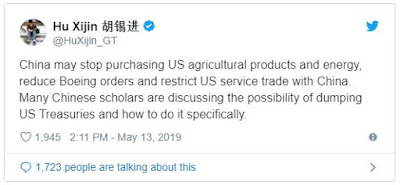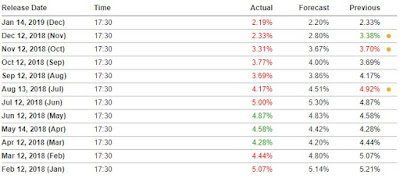China's failed 'Corbomite maneuver'
For those not as embarrassingly familiar with Star Trek lore as this author, the Corbomite maneuver is a bluff used by Captain Kirk to get out of a sticky situation. In an episode when the Starship Enterprise is faced with a powerful adversary, the captain threats to use a non-existent 'corbomite' device on board his ship to destroy the enemy. The adversary, unable to take the risk that such a device may actually not exist, relents and Kirk and his crew of 428 live to fight another day.
Matters however will have ended very differently (and the series rendered awfully short) had the enemy called Kirk's bluff. This is a bit like what is going on with China and its holdings of US treasuries at the moment. China is one of the largest holders of US debt, along with Japan. The situation (albeit from April 2019) looked a little something like this:
Source: The Visual Capitalist
There has been some chatter recently (and indeed keeps coming up from time to time) that China will dump its investment in US bonds to retaliate against American sanctions. A sample below from the tweets of editor-in-chief of the Global Times (an English language news arm of the China):
While there has been a gradual tapering of its holdings of US paper, it is far from a dumping, the threat of which is intermittently suggested.
Source: Reuters
This author believes that this threat is one that China cannot actually follow through on, and its attempted 'corbomite maneuver' has been called successfully by the USA.
The US Bond market is one of the most liquid markets globally, with average trading volumes over US$500bn per day. In a world increasingly looking for security and positive yield, there is no lack of buyers for this paper, as evidenced by Japanese holdings of bonds rising even as China's moderates (seen from chart above). With Chinese holdings of US paper roughly equal to two day trading of the bonds, they would run out of ammunition very quickly if they had to sustain pressure on US bonds for long.
Source: SIFMA, Authors calculation: Each monthly data point is average of 3 months to smooth the trend
And even if China is somehow able to maintain the selling pressure, it will have a negative valuation impact on that part of its portfolio that is still invested in US Treasuries. It is noteworthy that Chinese holdings of US treasuries is nearly 30% of its overall forex reserves of US$3.1 trillion.
Another unwanted side effect for China would be that the selling pressure on US paper would weaken the US$, and strengthen its own currency, the Yuan/ Renminbi. This would in turn be very favourable for US exports, and harmful for Chinese exports, which directly hurts their domestic economy. In fact this would play into the hands of the US President who has long argued that China is a currency manipulator.
Another question for China is the question of alternatives. If it sells US paper, where does it park the funds? US bonds are the only major economy's bonds that are yielding a meaningfully positive yield today (at 1.5% its also a sign of times of what we are considering as 'meaningful'). Comparable countries like Germany (-0.6%) or Japan (-0.26%) are negative yield. Gold is another option but its not something that can be bought from the proceeds of "dumping" US Bonds. The impact cost will be very high and disrupt global markets, which would be another hit against China's export oriented economy. Gold is something that China will steadily purchase (as should India in this author's opinion) and thus not a pawn for this supposed threat.
In summation, China lacks the ability to create a sustained pressure on the US bond market to cause a lengthy disruption. Even if it does, it would hurt China more due to valuation impact on the rest of its portfolio followed by its currency appreciating. Finally, it lacks alternative investments where it it practically shift the proceeds of its flash sale of US bonds with minimal economic impact. Checkmate.
No China, you do not have the Corbomite device.








Comments
Post a Comment